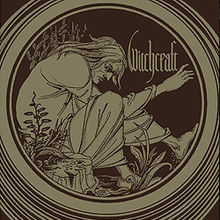
Album Review: Witchcraft Reissues
One of the benefits of discovering a band in its infancy is being able to watch them grow and develop as the years pass. The bands that shift their sound between records, never treading the exact same ground twice, are the ones that make for the most rewarding relationships between band and fan. In the over-saturated metal market, finding bands at the genesis of their sound is not easy, and many escape our vision until it's too late to enjoy the process of maturation. Metal Blade is reissuing the discography of doom band Witchcraft, giving everyone who missed these records the first time the chance to experience the music, and to witness the course of artistic maturation without the waiting periods.
Witchcraft's self-titled debut album, originally intended as a tribute to doom pioneers Pentagram, is an interesting take on the form. The vintage production is unlike anything doom metal is known for, the guitars never building the wall of crushing riffs we expect to hear. Everything reeks of the 70's on the album, from the caterwauling vocals to the thin level of distortion applied to the guitars. In terms of a retro rock band, the aesthetic is wonderful, but it never feels like doom. The slow tempos to the songs, the drawn out though not droning riffs, and the compulsory inclusion of Pentagram's “Please Don't Forget Me” should be enough to make the album firmly a doom effort, but something fails to click. Rather than a cascading wave of doom, the songs feel like a classic rock record played back at the wrong speed. Judging the end result is difficult, knowing how far off the mark the album ends up.
“Firewood”, the band's sophomore release, is a more refined version of the debut. The aesthetic is the same, although the sounds are cleaner, sharpening the attack of the music. Still lacking the necessary heft of the doom band they claim to be, “Firewood” is a more assured and confident record. Opener “Chylde Of Fire” outpaces the debut entirely on its own, with a superior vocal performance, more cutting selection of riffs, and a better sense of songcraft. The song is more their own, but still carries hallmarks of their influences, notable in the riff in the middle that bears more than a passing similarity to Black Sabbath's “Iron Man”. Hearing it takes you out of the song, which does disservice to the rest of the experience. The album is a significant step up on all levels, but brings with it the unfortunate sonic connection to the decidedly un-metal White Stripes. From the selection of guitar tones, to the timbre of the vocals, Witchcraft sounds much like a slightly darker and more mystical version of the chart-toppers.
“The Alchemist” finishes off the trio of reissues, and sees the band expanding the sonic palate once again, bringing together an even wider array of vintage influences to make their most diverse record. “If Crimson Was Your Colour” exemplifies this, bringing a heavy Doors influence into not only the more dramatic bluesy vocals, but the smattering of electric organ that pops up. “Leva” and “Hey Doctor” slow the tempos to bring a bit of doom flare to the table, while “Remembered” meshes a guitar lines not far removed from early Beatles records with a thick groove. It is an interesting experiment in contrasts, though its cohesion is up for debate. What's clear is that Witchcraft spread their wings and experimented with their songwriting even more than on the previous record.
The three Witchcraft albums are difficult to render a verdict on. The debut is rough around the edges, but “Firewood” and “The Alchemist” are enjoyable records with much to offer. The problem is that the band is sold as a doom outfit, while the music seldom bears much resemblance to what that would imply. As a classic rock band, Witchcraft is a success. As a doom band, they fall short of the mark. The prism through which you listen to these records shouldn't matter, but it always does. Fortunately, first impressions only last so long, and Witchcraft can escape the shadow of expectation.

